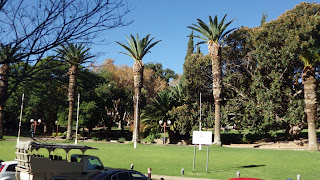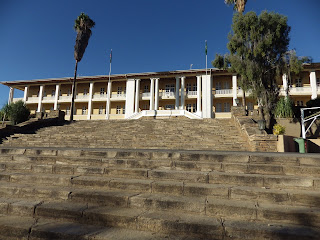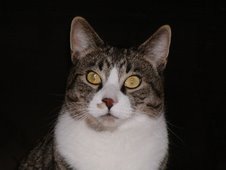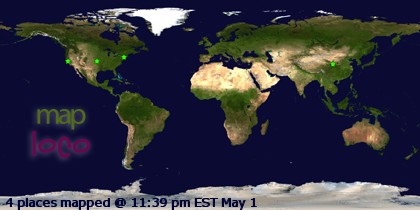 |
| Kudu |
 |
| Impala |
 |
| This could be an ad photo for Nomad |
 |
| There are +20 termite mounds in this one field |
 |
| The shape reminds me of something |
 |
| But not a lot of mountains |
 |
| Another shape that reminds me of something |
 |
| Not much of anything |
 |
| And there's lots of it |
 |
| Coming into town |
 |
| Government buildings can be nice |
 |
| Dutch colonial |
 |
| A pleasant enough looking town |
 |
| There's also Robert Mugabe Ave plus... |
 |
| A downtown park |
 |
| A classic '50s building |
 |
| Pretty art gallery |
 |
| Even more impressive new National Museum |
 |
| Right across from this church |
 |
| Now that's a juxtaposition of eras and architectural style |
 |
| Pretty building |
 |
| Nice gardens |
 |
| The front |
 |
| A peaceful garden |
 |
| Parliament |
 |
| Laid back and impressive at the same time |
 |
| Not sure who this guy is but he's leaking |
 |
| The steps |
Tomorrow, we head to Botswana (and lose an hour in the process due to time zone changes).
=================
Today’s Africa Travel Tip: Game Lodges
It’s tough to make a living ranching in many areas of Namibia, Botswana & even some areas of South Africa. Cattle yields are low (assuming you can run them), sheep are worse and goats are worse still. So imagine you’re a farmer with a big tract of land (and the farms in the desert areas are huge). Why not quit farming, sell your cows, build a few guest cabins (which are built for an incredibly cheap price of R800 per square meter) and start a game ranch and lodge? Voila, farmer to the tourist business in one easy step.
All you need to do is put a big fence around your property and whatever’s inside – kudus, oryx, lions, springbok, elephants, zebra, and any other critters – are now “yours”. Now you don’t need to do anything except provide a water hole, as all the native animals live just fine on the land. You could go full "eco" and host your own game drives on your property, or you may even hunt most (not all) of the animals on your own land, so you could advertise yourself as a game and hunting lodge; all you need is a professional hunting guide designation to lead hunts on your own farm. Most trophy hunters just want the head; you get the rest of the oryx they kill, and you can sell the meat to restaurants (or you can charge more if the hunter wants the whole thing stuffed).
Game farms or lodges don’t actively farm the animals; they just don’t provide other animals to compete with them for precious water and grass resources. Some don’t even put up fences other than to keep critters off roadways. Some get together with other ranches to build huge private game reserves (there are a couple surrounding Fish Canyon, like the Gondwana Cañon) that are in some cases bigger than the national parks themselves.
Farms turned game lodges are everywhere in Namibia, and there are a lot in South Africa, too. Some are proud to announce that they have cheetahs or rhinos. Namibia considers this a conservation success as land is reclaimed back to native animal habitat. It also explains why it’s OK to eat game meat in restaurants.


No comments:
Post a Comment